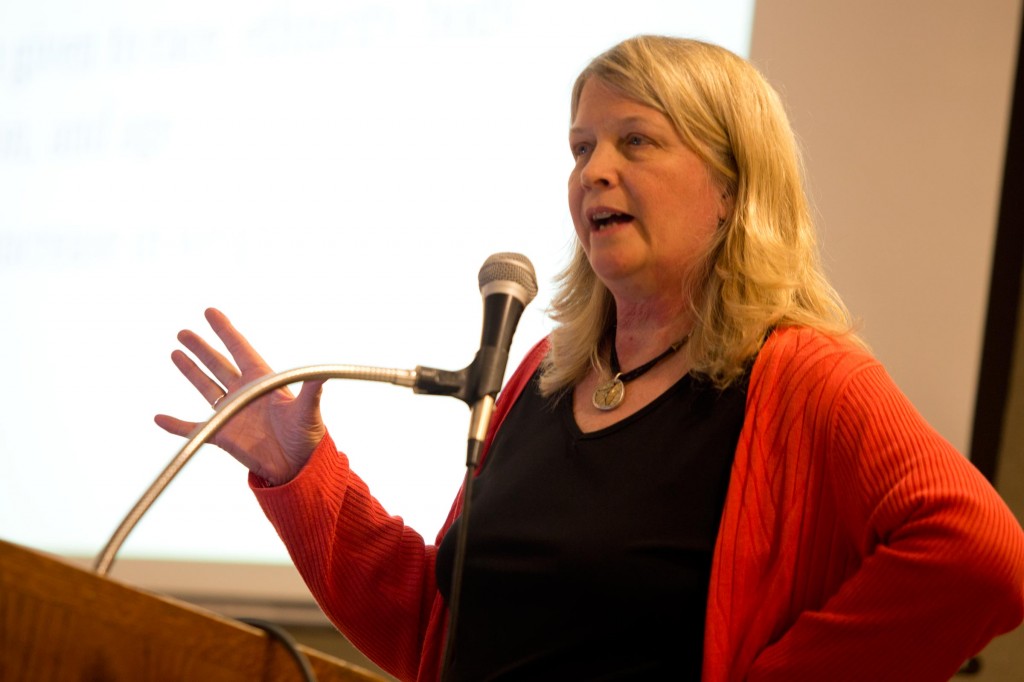
With 20 years of experience in the field of nutrition and eating disorders under her belt, registered dietitian Carolyn Hodges lectured on how to make the body burn fat to nearly 100 people Tuesday evening.
Hodges discussed the effects of dieting on the metabolic process as well as our society’s obsession with being thin.
“Our culture has become very fat-phobic and has gone to extreme measures to be thin,” Hodges said.
Throughout her presentation, Hodges said that certain diets do not work and lower caloric intake actually lowers our metabolism and makes our bodies store fat more easily. Additionally, excessive aerobic activity can be detrimental to our health.
“There are many different opinions on how to burn fat, and a lot of things people do wrong,” she said.
According to Hodges, individuals can speed up their metabolism by meeting protein requirements, eating more often, paying attention to their meal times, getting at least seven hours of sleep and exercising.
Specifically, Hodges recommended that two-thirds of total caloric intake should happen by 3 or 4 p.m. She said that skipping breakfast reduces the body’s metabolism by 10 percent.
Alcohol can also interfere with weight loss and may cause weight gain, Hodges said. She was met with gasps from students in the audience when she used an analogy involving butter to demonstrate the unhealthiness of alcohol.
“Think about it this way — one shot is equivalent to one tablespoon of butter, so four or five shots is a half stick of butter,” she said.
Hodges also discussed how prevalent and harmful eating disorders are, giving the statistic that 50 percent of females between ages 18 and 25 say they would rather be run over by a truck than be fat.
The lecture was the first installment in a series sponsored by the Eating Awareness Committee and Sodexo. The series coordinates with Eating Disorders Awareness Week, which is the last week in February, and National Nutrition Month in March.
Jennifer Wegmann, a lecturer in health and wellness studies at Binghamton University and a member of EAC, talked about the group’s mission to provide resources, education and outreach relative to nutrition, fitness and body image.
“College life poses some challenges to students, but the bottom line is that we all, college or otherwise, have the capability to maintain our health; it just takes time, effort, and planning,” Wegmann said. “That’s some of the problems that college students face, the time and planning involved gets pushed down the priority scale because there’s work, studying … a lot of things.”
Meredith Abel, a sophomore majoring in philosophy, politics and law, said that Hodges shed a different light on caloric intake.
“While society incessantly stresses cutting calories, the speaker really stressed that it’s quality of calories rather than quantity that counts,” Abel said.
Monica Efman, a junior majoring in human development, said she also learned from Hodges’ lecture.
“I thought it was interesting how she discussed the differences between eating disorders and disordered eating,” Efman said. “She made interesting analogies to make it clear how bad certain things we eat and how we eat are actually harming us.”
Chris McQuade, a junior majoring in finance, said good nutrition is important and too often neglected.
“I think the presentation really reiterated the idea that the food you eat can either be the safest, most powerful form of medicine or the slowest form of poison,” McQuade said. “I think it’s important for students to learn about the complexities of the metabolic process because nutrition is a vital aspect of everybody’s daily life and is often something that is overlooked or misconceived.”


